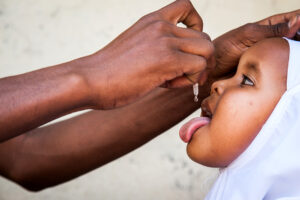
When thinking about the Rotary Clubs in our communities, what mostly comes to mind is the local service work: food pantries; scholarships; support for youth sports and scouting; community beautification, etc. The signature events of local clubs occupy an important place on the annual calendar of the communities they serve: the Peekskill Rotary Horse Show (virtual in 2020); the Croton Rotary Car Show (a parade this year); Tarrytown Rotary’s Ducky Derby (live streamed in 2020).
But Rotary has another, international dimension that has been in the news this fall. Rotary International, supported by some 35,000 clubs around the globe, promotes peace, fights disease, provides clean water, and supports economic development for communities in poor countries. And in 2020, disease prevention efforts supported by Rotary International marked a milestone in the eradication of polio, also known as infantile paralysis, a viral infection that led to the death or disability of thousands of Americans until a vaccine was developed in the 1950s.
Although widespread vaccination has virtually eliminated the disease in countries with well developed public health systems, polio has persisted with tragic consequences in many developing countries. In the 1980s, Rotary International launched an effort to stamp out polio through universal vaccination.
“Rotary members have contributed over $2 billion to the effort to eradicate polio worldwide,” said Seaver Wang, president of the Rotary Club of Croton-on-Hudson. “Today, nearly half a billion children in developing countries are immunized each year.”
As a result of these efforts, the World Health Organization declared in August that the most dangerous form of the virus has been eradicated from the entire continent of Africa. At the height of the epidemic in Africa, approximately 75,000 people, mostly children, were stricken by the disease every year.
Maintaining immunity remains a challenge, particularly in areas with unstable political and economic environments. In addition to a continuing epidemic in parts of Pakistan and Afghanistan, other forms of the virus remain a threat if ongoing vaccination programs in Africa and other vulnerable regions cannot be maintained.
“That is one of the benefits of a long term commitment by organizations like Rotary International,” said Wang. “By continuing to monitor and immunize populations in developing countries, we can avoid the sort of outbreaks that have been such a terrible problem historically.”
So when we support local service organizations, like our Rotary or Lions Clubs, we are also helping to protect others less fortunate than ourselves from serious health threats that can be conquered by modern medicine if only the resources are available to them. You can learn more about the work of Rotary International at https://www.rotary.org/en/our-causes.






